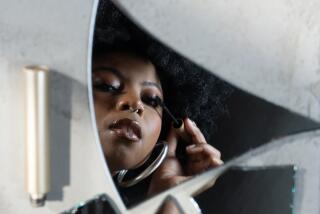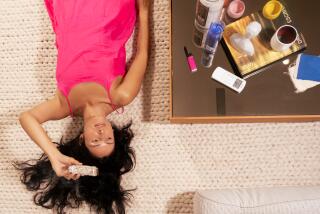Kjerstin Gruys’ year without a mirror gave her a true look at herself
- Share via
Kjerstin Gruys is a UCLA doctoral student in sociology with a keen, feminist’s interest in body image. Her dissertation will plumb the relationship between appearance and inequalities in the workplace.
Acutely aware of how our permeating obsession with beauty and thinness instills insecurity in young women, she nevertheless embraces her girly side.
Gruys loves clothes, makeup and shopping.
But in 2011, six months before her wedding at a Woodside, Calif., winery, Gruys, now 30, did the unthinkable. Tired of obsessing over wedding gowns and losing weight, she decided to give up mirrors. For 12 months, she would live without her reflection.
How could a young woman with one foot in the world of wedding prep voluntarily forgo pre-nuptial narcissism? After all, this is just about the only time in a woman’s life that the culture not only sanctions such extreme self-focus, but pushes it with a vengeance.
It wasn’t easy.
“I’d spent close to a decade pondering this curious relationship between feminism and beauty and my own place within these debates,” Gruys wrote in her new memoir, “Mirror, Mirror Off the Wall: How I Learned to Love My Body by Not Looking at It for a Year.” But planning the wedding had catalyzed “a fundamental mismatch between my values and my vanity.”
Gruys was struggling to come up with answers to seemingly flip but nontrivial questions: “Could I still be a real feminist if I shaved my legs and armpits? How about if I wore a push-up bra? Was I supremely naïve to feel so empowered by a good hair day? And why did I feel so proud — as though I’d somehow ‘made it’ — when I was interviewed for a book titled ‘Sexy Feminism: A Girl’s Guide to Love, Success and Style’?”
Perhaps, she thought, the project would bring her values and vanity into better alignment. “Sometimes,” she wrote, “you have to do something extreme and crazy in order to find balance and sanity in the end.”
She was smart enough to realize that, on some level, giving up mirrors was itself a form of vanity — “a vain exercise in reducing my vanity,” she said over lunch at the Novel Café in Westwood. “On one hand, yes, it is self-centered to spend a year thinking about beauty and vanity and your own role in that, and yet the goal was to figure out if I could give those things up, and what happened is, I realized I could.”
With her sociologist’s eye, she chronicled her struggles — moving, funny and occasionally cringe-worthy. The practical obstacles were not minor.
To blot out her reflection, Gruys hung sheets over the mirrors in her Westwood condo, averted her gaze when a storefront window beckoned and used the mirrors in her car only for driving.
She pared down her closet, taught herself to apply a bare minimum of makeup and depended on friends and loved ones to tell her if she had broccoli in her teeth.
Makeup vexed her. Her dependence on it, she wrote, was “an unhealthy addiction.” Though you would never know it from her lovely complexion, part of that stemmed from a problem with bad skin.
“I’d viewed makeup as a necessity, something I couldn’t go without,” she wrote. “The idea of not having it on hand made me anxious. Even if I couldn’t see it, I believed my makeup helped me look more polished, more feminine and prettier.”
She grappled with her feminist ambivalence over her mother-in-law’s penchant for plastic surgery — breast implants, “at least one face lift” and Botox injections — until she grasped that this is what made her mother-in-law feel beautiful and whole. Her mother-in-law’s unapologetic beauty quest set off a crisis of self-confidence in Gruys, however. At 5-feet-5 and 155 pounds, she fretted she wasn’t tall enough or thin enough to pass muster with her mother-in-law. (Her fiancé, now husband, Michael, was supportive and loving throughout the project, she notes.)
A couple of weeks before the Oct. 1 wedding, after seeing a friend’s gorgeous fake lashes, Gruys gave in to the urge to buy eyelash extensions at a beauty salon.
After her dissertation advisor reacted in shock the next day, she decided she’d ended up looking “more Tammy Faye than Bambi” and had a meltdown.
Sitting on her couch, sans mirror, she plucked off the lashes one by one, pulling out some of her own in the process.
“I found myself morphing back to my scab-picking, nail-biting 10-year-old self,” Gruys wrote. “Sure, I wasn’t obsessively counting calories or berating myself for not going to the gym, but compulsive behaviors like this only show up when I’m under a lot of stress and not coping well.”
It was, in some ways, an echo of the eating disorder she had developed as a teenager in St. Louis, where she competed in basketball and track and field.
“I was already thin and athletic,” said Gruys. “But I started losing weight because I was anxious and depressed, and I found out that not eating calmed my anxiety.”
She was never among the coolest kids, she said, and so the compliments on her weight loss from her school’s queen bees triggered the desire to keep losing weight. Eventually, psychiatric help and medications helped alleviate her emotional issues, but when she started eating again and began gaining weight, she missed the social approval and began an unhealthy cycle of crash dieting to the point of suffering kidney damage. “They say your biology loads the gun and the culture pulls the trigger,” she said.
At 12 months of no mirrors, she threw a “First Look Party.” Her mother-in-law’s gift: a magnifying mirror.
It came in handy, because soon, said Gruys, she suffered a “vanity relapse.”
“After seeing myself, I was so in love with my reflection,” she said. “But some of the smaller things I had decided were completely unimportant were important again: whether or not I had clogged pores on my nose or if I had a tiny bit of eyebrow that needed to be tweezed again. I was fascinated by it.”
But then life got busy for Gruys, who lives in San Francisco, where her husband works as a biomedical engineer. Vanity receded.
“What I want women to think about is whether their body image would be healthier if they just cared less,” she said. “If every little girl in America thought that she was not beautiful and said, ‘So what?’ I would be thrilled.”
“Mirror, Mirror Off the Wall: How I Learned to Love My Body by Not Looking at It for a Year,” Kjerstin Gruys; Avery; 320 pp; $26.
More to Read
Sign up for our Book Club newsletter
Get the latest news, events and more from the Los Angeles Times Book Club, and help us get L.A. reading and talking.
You may occasionally receive promotional content from the Los Angeles Times.







